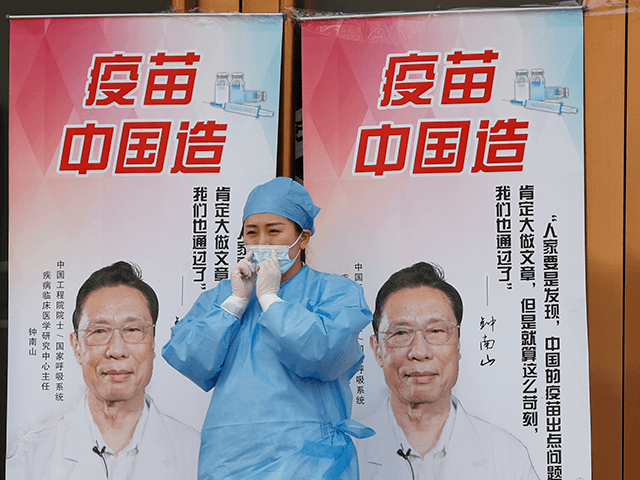China’s top infectious disease expert Zhong Nanshan warned once again on Thursday that the Communist Party’s efforts to vaccinate its citizens against Chinese coronavirus are “lagging” behind countries like the United States and Israel.
Chinese officials have boasted of vaccinating more people than any other country in the world, claiming to have infected 350 million doses of Chinese vaccine candidates into people since approving domestic inoculation products. Since China is the world’s most populous country, however, its raw number of injections equates to a much smaller percentage of people who count as “fully vaccinated,” meaning they have received the full two doses of products made by local manufacturers like Sinopharm and Sinovac Biotech.
Zhong’s warning did not take into consideration concerns that Chinese vaccine products have failed to protect other countries that have relied more heavily on them, like Chile and Seychelles. The head of China’s Center for Disease Control, Gao Fu, admitted publicly in April that Chinese vaccine products “don’t have very high protection rates” – remarks that also likely did little to encourage Chinese citizens to trust the products.
Zhong remarked on China’s poor vaccination performance at an event on Thursday, according to the Chinese government outlet Global Times.
“Although China currently leads the world in terms of the number of COVID-19 [Chinese coronavirus] vaccinations administered, the coverage rate in the country is only about 23%, lagging behind other countries such as Israel, the US and the UK,” the newspaper paraphrased Zhong as saying. The Global Times noted that 350 coronavirus vaccine candidate shots have gone into arms in China – meaning about half of this number of people are fully vaccinated, far more than most countries. China is home, however, to 1.4 billion people, meaning it has a far higher raw number threshold of vaccinations to reach to achieve herd immunity than smaller countries.
“Zhong called for herd immunity to be achieved through vaccination as soon as possible to reduce the negative impact of COVID-19 on global economic and social development,” the state newspaper noted.
Zhong, who received top honors from the Communist Party last year for his role in the coronavirus pandemic, has repeatedly warned that insufficient vaccination could result in a prolonged pandemic, not just a resurgence of the disease in its origin country.
“If China continues with such a low vaccination rate, it will not keep up,” Zhong warned at an online event in March. “There’s a possibility that in the future, other countries will have [herd immunity] but China doesn’t.”
Zhong explained at that event that he believes that Chinese people are less enthusiastic than others around the world to receive a vaccine candidate dose because the Communist Party has insisted for over a year that coronavirus was no longer a local threat to them. Experts believe that what became a pandemic originated in Wuhan, central China, in late 2019. By March 2020, dictator Xi Jinping proclaimed in Wuhan that the Party had triumphed over the disease. State media outlets have described the ongoing epidemic after that initial “victory” as separate, contained “outbreaks” in various regions, even when they clearly surfaced simultaneously. The Communist Party has also published propaganda featuring mass super-spreader events in Wuhan and other densely populated cities to convince citizens the pandemic no longer threatens them.
Unlike in most other countries launching vaccination drives, dictator Xi Jinping has played no role in encouraging Chinese people to get vaccinated. The Communist Party has not clarified, and has pointedly refused to answer when asked, if Xi himself has received a vaccine dose. Xi often makes time for the promotion of other, seemingly less important Chinese products – like largely unproven “Traditional Chinese Medicine” products and “local specialty fungus” – but not for the nation’s vaccines. Xi’s public embrace of Chinese-made vaccines is likely more important than that of world leaders elsewhere due to the poor safety record and recent criminal history of China’s vaccine industry.
CDC Director Gao Fu’s declaration that China’s vaccines, especially compared to American products using innovative mRNA technology, “don’t have very high protection rates” likely hurt the nation’s vaccination drive. Gao insisted shortly thereafter that direct quotes of his remark were a “complete misunderstanding” and that he simply meant to urge Chinese companies to pursue the development of mRNA vaccines at home.
The Global Times reported on Tuesday that the Communist Party has established the creation of a “National Bureau of Disease Control and Prevention,” debuting on Tuesday, whose powers will be superior to Gao’s CDC. The Times claimed the new agency was necessary to help draft more public health policies and “enhance the nation’s post-epidemic health governance,” but the timing appears to follow multiple public statements by Gao at odds with the Party line.
In January 2020, Gao told reporters conclusively that the “origin of the new coronavirus is the wildlife sold illegally in a Wuhan seafood market.” Most mainstream scientists still consider this a plausible theory – the World Health Organization (W.H.O.) considers animal-to-human transmission the likeliest explanation for the new pathogen – but the Chinese Communist Party has since begun insisting that the virus did not originate in China at all, but at a U.S. Army laboratory in Maryland. Beijing has failed to offer any evidence to support its claim.

COMMENTS
Please let us know if you're having issues with commenting.